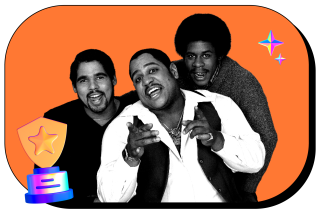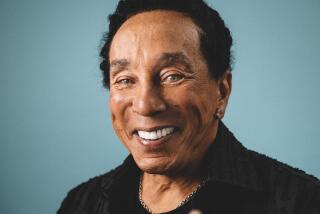Mary Wells; Motown Star Sang ‘My Guy’
- Share via
Mary Wells, one of the soul singers of the early 1960s credited with helping carry what was known as the Motown sound into the consciousness of all America, died Sunday of cancer.
Miss Wells, whose hits included “My Guy” and “You Beat Me to the Punch,” was 49 and most recently was in the news when word of her financial distress surfaced, setting off a fund-raising campaign.
Her daughter, Stacy Womack, said her mother had been operated on for throat cancer in 1990 and died at the Kenneth J. Norris Jr. Cancer Hospital, where she had been for several months.
With such crossover artists as Smokey Robinson, the Supremes, the Temptations and the Four Tops, Miss Wells was one of the black artists who rose from the limited arena of low-watt radio stations and unheralded record labels into the mainstream of music.
First teen-agers and then their parents tapped their feet to her sad tales of unrequited love and her bouncy rhythms of young romance.
She first hit the nation’s Top Ten in the early 1960s with “The One Who Really Loves You,” “You Beat Me to the Punch,” “Two Lovers” and her signature song, “My Guy,” all written or co-written by Robinson, a fellow Motown recording star.
“In 1964, Mary Wells was our big, big artist,” said Lucy Gordy Wakefield, Motown’s first sales chief. “I don’t think there’s any audience with an age of 30 through 50 that doesn’t know the words to ‘My Guy.’ ”
Miss Wells toured with the Beatles. “John Lennon was funny but always gentle to me, always respectful,” she once said in an interview. “I have a hard time with the fact that some fool murdered the man.”
Like many artists of the time, Miss Wells was naive about the business end of the music, longtime friend Maye James told the Associated Press on Sunday from New York.
“They were beat out of a lot of money, Mary included. They were just signing contracts, they were so happy to be making music,” she said.
Miss Wells began singing at age 10 at churches in her hometown of Detroit. She was fatherless, said her daughter, and her mother supported Mary by working as a maid.
When she first approached Motown Records founder Berry Gordy hoping to sell a song she had written, he instead auditioned and signed her as a singer.
Her song, “Bye, Bye Baby,” was an immediate hit.
She left Motown, where she was teamed with Marvin Gaye on “What’s the Matter With You Baby,” in a contract dispute and signed with 20th Century Fox records in 1964. She later recorded for Atlantic-Atco, Reprise and Jubilee, but never realized her earlier successes.
After her second marriage--to Cecil Womack--and the birth of four children, she quit performing in the early ‘70s to raise her family. She began singing again in 1978 at clubs around the country.
When Miss Wells was found to have cancer, the two-pack-a-day cigarette smoker had no medical insurance, and she lost her modest home in Los Angeles when she could not pay the rent.
The Washington-based Rhythm and Blues Foundation raised more than $50,000 to pay for her medical bills. Diana Ross gave $15,000, Rod Stewart and Bruce Springsteen $10,000 apiece, and the Temptations $5,000.
“People say this is a cruel business--and it is,” Miss Wells told The Times shortly after her surgery in 1990. “But a lot of people in the business do have hearts.”
After the operation, Wells underwent chemotherapy. In June, 1991, doctors found that the cancer was spreading, and she began an experimental drug regimen. She resumed standard treatment late in 1991.
She and Womack were divorced. Besides her daughter, she is survived by three other children, Cecil Jr., Harry and Sugar Womack, and a brother, Fletcher Wells.
More to Read
The biggest entertainment stories
Get our big stories about Hollywood, film, television, music, arts, culture and more right in your inbox as soon as they publish.
You may occasionally receive promotional content from the Los Angeles Times.










